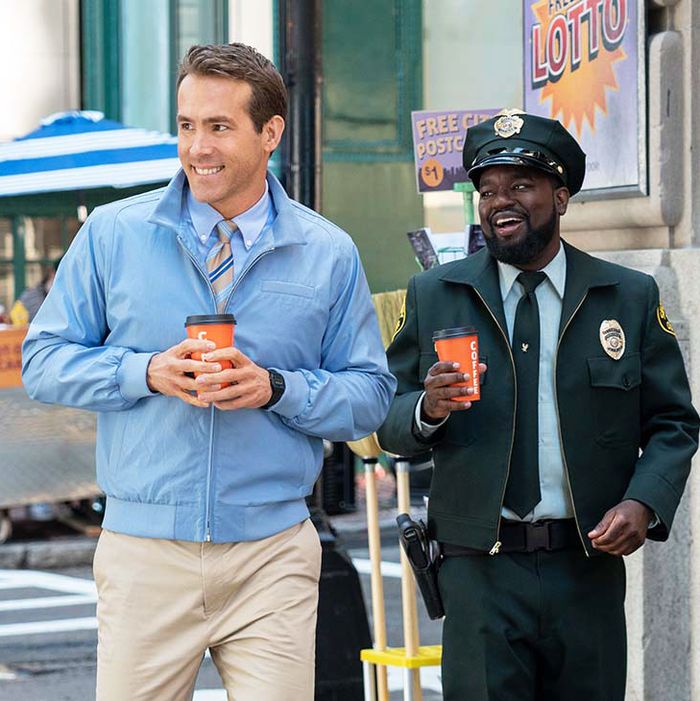
For a film that doesn’t have an original bone in its body, Free Guy is surprisingly tolerable. “Good” isn’t the word, though. Shawn Levy’s galactically derivative action-comedy mixes elements from The LEGO Movie, The Truman Show, They Live!, The Matrix, Wreck-It-Ralph, Ready Player One, and any number of other (mostly better) films to create something that goes down relatively smoothly but has distressingly little on its mind. But like its star, Ryan Reynolds — and maybe thanks to its star, Ryan Reynolds — the picture occasionally seems aware of its limitations. At its best, it turns its cynicism into an asset.
Reynolds plays Guy, a blue-shirt-wearing bank teller who, though he doesn’t know it yet, is an NPC — a non-playable character — in an elaborate, highly popular video game called Free City. His sole purpose, it seems, is to dive for cover when the bank where he works is robbed repeatedly. (His best friend, Buddy, played by Lil Rel Howery, is a security guard who basically does the same thing — every day, they chat casually as they lie face-down on the bank floor.) One day, however, instead of doing as he’s told, Guy grabs the dark glasses off one of the robbers, and discovers that they reveal a whole universe of special powers and pathways and other video-game doodads that suddenly allow him to navigate and change his reality in new ways. He starts to break free of his programming, in other words.
Players in the real world start to take notice, and assume that Guy is another player in an NPC’s skin, or that he’s being controlled by some sort of hacker. But real-world programmers Keys (Joe Keery) and Millie (Jodie Comer) start to wonder if maybe Guy is the kind of artificially intelligent character they had always dreamed of: a computer-generated figure who can learn and grow and become so genuinely self-aware that he can chart his own destiny. Millie, who herself roams Free City as a Trinity-like avatar named Molotov Girl, strikes up a friendship with Guy, which starts to turn romantic; meanwhile, she’s waging a secret battle against obnoxious tech-bro Antwan (Taika Waititi, going a little too hard), the head of the company that sells Free City, who may have stolen the code for a far more innovative but significantly less popular program Millie and Keys created years ago.
There is certainly an idea here, about the ways in which the individual can break free of any number of social constraints that seem to predetermine one’s destiny — race, class, gender, etc. (When other players admire Guy’s “skin” and ask him where he got it, he is both bewildered and flattered.) Nevertheless, it does feel like a joke that Ryan Reynolds of all people — the guy Hollywood desperately tried to turn into a movie star for the better part of a decade — comes to represent this awakening of identity.
And yet, Reynolds is sort of perfect for the part, too. In his early years, when he seemed to go from one underperforming vehicle to another, what kept him back was a veneer of insincerity which compromised every line of dialogue, every gesture and glance. There was an icy, almost sociopathic quality to his performances. (That’s partly why he made a great Van Wilder, but flopped cataclysmically as the Green Lantern. It’s also why the films that successfully capitalized on his existential disingenuousness, like Mississippi Grind and the Deadpool movies, benefited immeasurably from his presence.) Here, he actually excels at playing a character composed entirely of ones and zeros; his awakening is not emotional, but practical and technological. It’s okay for Guy to have no real depth, because he’s not an actual person.
Reynolds’s robotic charm gives the film a wink-wink quality that can make it seem smarter than it is. Even late in the picture, when it starts to free-associate with Disney/Fox properties, one could be forgiven for thinking that the movie is attempting to parody the more earnest pandering of, say, Space Jam 2. Meanwhile, a romantic subplot involving Millie and Keys is so haphazardly handled that you might briefly entertain the notion that the film is spoofing Hollywood’s boilerplate romantic subplots. That is the point at which you realize you’re giving Free Guy way too much credit. The generic quality of this film is not really a “comment” on anything; it’s just generic.
Credit Reynolds for making this thing watchable, but watching a nonperson does get tedious after a couple of hours. There are the shards of an interesting story in Free Guy, about how Guy’s awakening allows him to inspire both people in the real world and the other NPCs in Free City to realize that there’s more to life than simply playing a role in others’ plans. But director Levy’s almost pathological lack of visual imagination makes sure to scuttle any grand themes. How does one make a movie about awakening to the infinite possibilities of existence — about discovering secret powers and the malleable boundaries of one’s world — so cinematically uninspiring and uninteresting? Levy’s prime dictum appears to be to never take any aesthetic risks. But Free Guy is supposed to be a movie all about taking risks. What’s the point of breaking the fourth wall if there’s nothing on the other side?
More Movie Reviews
"Review" - Google News
August 14, 2021 at 02:47AM
https://ift.tt/3iM3mqa
Ryan Reynolds (Almost) Saves Free Guy, Believe It or Not - Vulture
"Review" - Google News
https://ift.tt/2YqLwiz
https://ift.tt/3c9nRHD
Bagikan Berita Ini














0 Response to "Ryan Reynolds (Almost) Saves Free Guy, Believe It or Not - Vulture"
Post a Comment